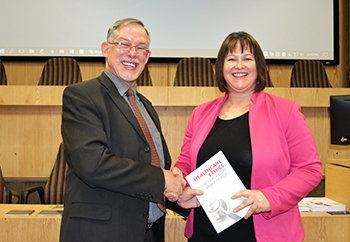Latest News Archive
Please select Category, Year, and then Month to display items
12 October 2020
|
Story Dr Cindé Greyling
|
Photo Supplied
 Exercise and nutrition can work wonders for your mental health – you don’t even have to ‘feel like’ or ‘enjoy’ moving around and eating well for it to work – it does its thing anyway.
Exercise and nutrition can work wonders for your mental health – you don’t even have to ‘feel like’ or ‘enjoy’ moving around and eating well for it to work – it does its thing anyway.
Nowadays, people talk about mental health like it is the common cold – which is good! But do you know what it really means? Being mentally healthy does not only refer to the absence of a mental illness but includes your emotional and social well-being. One would almost want to add physical well-being too, since a healthy body does indeed support a healthy mind. However, since so many people consider themselves ‘mental health experts’, some myths have been sold as truths.
Myth #1 – You are doomed.
Nope. Never. You are never doomed. There is always help. Mental-health therapies range from self-help, talk therapy, medication, to hospitalisation in some cases. Somewhere on this spectrum of treatments, there will be something that works for you. But you must be willing to get the help and do the work. For starters, exercise and nutrition can work wonders – you do not even have to ‘feel like’ or ‘enjoy’ moving around and eating well for it to work – it does its thing anyway.
Myth #2 – It won’t affect you.
It may. Research suggests that one in five people may suffer from a mental illness at some point in their lives. Being well now does not mean that it will stay that way. Biological and environmental factors both impact your mental health. Hopefully not, but at some point, you may experience an event that affects your mental health.
To remain integrated in a community is always beneficial
for anyone suffering from a mental or physical condition.
Myth #3 – Someone struggling with mental health must be left alone.
Hardly! To remain integrated in a community is always beneficial for anyone suffering from a mental or physical condition. You do not need to fix them, but to remain a friend. Continue to invite them, even if they decline. Do not judge, and do not try to understand. Just stay around.
Go and be kind to yourself, and to those around you.
Ethics at the heart of healthcare practice
2017-05-17

Prof Gert van Zyl during the launch of Health
Ethics for Healthcare Practitioners with
Prof Laetus Lategan at the Central
University of Technology.
Photo: Supplied
The Central University of Technology (CUT) in partnership with the University of the Free State (UFS) launched a newly published book: Health Ethics for Healthcare Practitioners that aims to raise awareness among healthcare practitioners and patients about various unethical challenges faced by healthcare services in both the private and public sectors.
Prof Laetus Lategan, Director of Research Development and Postgraduate Studies at CUT, and Prof Gert van Zyl, Dean of the UFS Faculty of Health Sciences, are the co-editors of the book intended to provide a moral guide to healthcare professionals when dealing with their patients.
Holistic approach to healthcare practice
Their work places renewed emphasis on the importance of healthcare ethics. This is due to a diversifying range of healthcare services and the imminent collapse of the public healthcare service sector; most notably in developing countries. The authors particularly focus on how their findings can be integrated into real-life situations.
The book looks at modern-day healthcare ethics and how they apply to both patients and healthcare practitioners including doctors, professional nurses and therapists. It is an elaborate reference book that will help healthcare practitioners to make informed decisions should they be faced with ethical dilemmas in their practices and assist them to gain a better understanding and devise solutions to problems faced by communities.
Academic journey and partnerships forged
Prof Van Zyl said the book had been a joyful journey of collaboration between the two universities, a journey of academic colleagues who become friends. He explained that they wanted to focus on creating new approaches to healthcare from an ethical perspective, to provide a guide and reference on ethics, not only to healthcare practitioners, but also to patients. “We hope this book will make a difference in healthcare delivery,” he concluded.
Prof Lategan said modern science needed to become more interdisciplinary, which would transcend the way science was conceived. “The essence of healthcare is to be of service to other people and have relationships with other people. I think it’s high time for us to start caring for one another, especially in the academic environment. If we are really looking after the health of other people, whether it is mental, spiritual or physical health, it starts with caring for other people.”